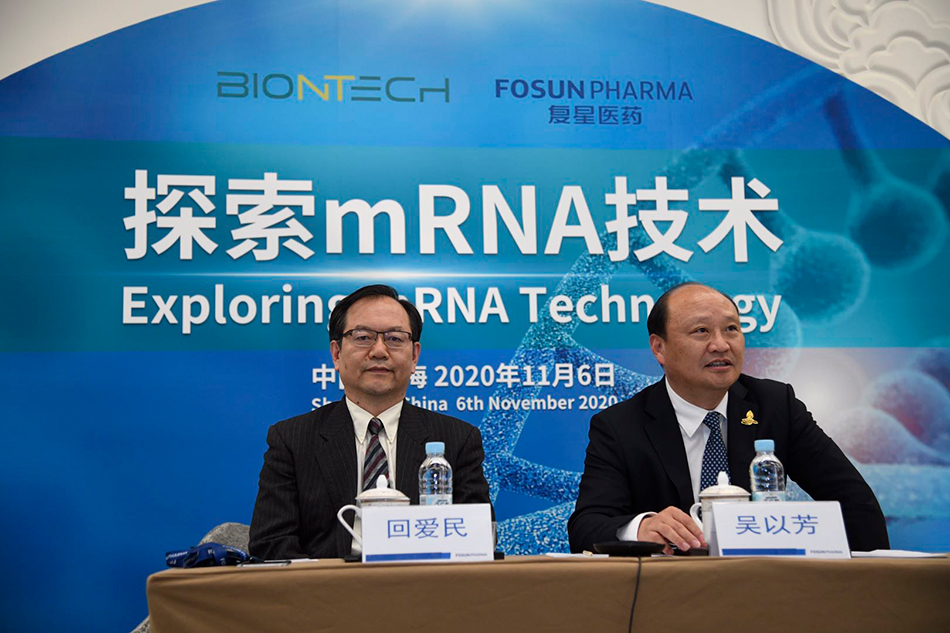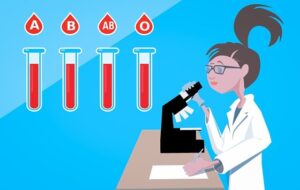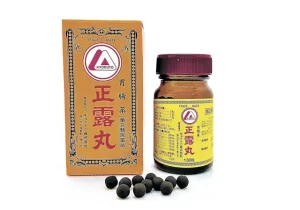China Fosun COVID-19 Vaccine 95% Effective
China Fosun COVID-19 Vaccine 95% Effective
China Fosun COVID-19 Vaccine 95% Effective. Fosun Pharma globally with mRNA COVID-19 vaccine, and the final effectiveness of overseas phase III clinical trials is as high as 95%

There was no serious adverse reaction! Fosun’s global collaboration of mRNA COVID-19 vaccine overseas phase III clinical final effectiveness as high as 95%.
On November 18th, Pfizer and BioNTech stated that the final data of clinical trials showed that the co-developed new coronavirus vaccine is 95% effective in preventing new coronavirus infections [1] [2], and it did not cause serious side effects.
The vaccine is called BNT162b2, which is highly effective against infection 28 days after vaccination, and its effectiveness is the same in different ages and races. In China, BNT162b2 was approved for clinical trials by the National Medical Products Administration on November 13. It is planned to carry out phase II clinical trials of the vaccine in China when conditions are met.
Interpretation of the advantages of mRNA COVID-19 vaccine
mRNA vaccine is a new type of nucleic acid vaccine, which is different from traditional vaccines such as inactivated vaccines and attenuated vaccines. The vaccine platform aims to introduce the genetic information of the antigen into the human body instead of the antigen itself to stimulate the subsequent immune response in the body. The mechanism of action is also a revolutionary breakthrough.
So why is the mRNA vaccine in the leading position among the vaccines that are highly hopeful to be approved for marketing? Specifically, it is closely related to the following significant advantages of mRNA technology [3]:
(1) Good safety
There is no risk of infection. The mRNA new coronavirus vaccine currently under research is to deliver the mRNA encoding the new coronavirus S protein using a specific carrier (both BioNTech and Moderna use nanolipid particles) as a medium, and synthesize antigens in the body to stimulate an immune response. Because mRNA is not a complete virus, it does not bring the risk of infection that other vaccine types may cause. mRNA will not enter the nucleus and integrate into the host’s genome. From this point of view, it is safer than DNA vaccines.
Combined with the previous safety results of the Phase I clinical trials conducted in the United States and Germany published by BioNTech/Pfizer in NEJM, the BNT162b vaccine has good safety without any serious adverse events [4] [6], showing the safety and safety of mRNA. The tolerance is ideal.
(2) High R&D efficiency
The mRNA vaccine synthesis process is relatively mature and relatively convenient. From vaccine design to sample preparation, it can be completed within 1-2 months. BioNTech/Pfizer/Fosun Pharma’s vaccine development “Speed of Light Project”[5] only took 5 months from initiation to preliminary screening of vaccine formulations and the beginning of clinical trials. Compared with other types of vaccines, which have been developed over many years, these data fully reflect the characteristics of high efficiency and short cycle of mRNA vaccine development.
It is worth reminding that because the structure of the mRNA itself is easy to modify, it is easy to modify and replace the vaccine mRNA components such as “capping” and nucleotide modification based on objective conditions such as virus mutations [10], which is also mRNA One of the advantages of vaccines.
(3) Good immunogenicity
The mRNA vaccine can activate humoral immunity and cellular immunity at the same time. The strong immunogenicity determines that the mRNA vaccine has a relatively stronger effect on the prevention of the new coronavirus.
In the previous phase I trial, BioNTech’s BNT162 vaccine vaccinators had even higher levels of neutralizing antibody titers after vaccination than those recovering from COVID-19. In the phase I/II trial conducted in the United States, the 10μg and 30μg dose groups neutralized The antibody GMTs were 168 and 267, respectively, which were 1.8-2.8 times the serum neutralizing antibody GMTs (94) of SARS-CoV-2 infected persons during the recovery period, proving its immunogenicity advantage [6].
Not only that, in this phase III interim analysis, the effectiveness of the two mRNA new coronavirus vaccines was analyzed by analyzing the percentage reduction in the incidence of new coronavirus infections in the vaccine group and the control group, and both reached a conclusion of more than 90% effectiveness. , Especially today, Fosun’s global collaboration of mRNA COVID-19 vaccine, the final clinical effectiveness of the overseas phase III clinical trial is as high as 95%, and there is no case of serious adverse reactions, which proves the strong position of mRNA technology in immunogenicity.
But in the long run, given that the respective phase III trials have not ended, the results have not yet been fully announced, and the final results on the effectiveness of the two vaccines still need to be observed.
(4) Easy to mass produce
Because the mRNA vaccine itself can be produced through chemical synthesis, it is undoubtedly a relatively better choice for the large-scale outbreak of the COVID-19 epidemic. Especially for companies like BioNTech that have been deeply involved in mRNA therapy for many years, it is not a problem to cooperate with Pfizer to complete the mass production of vaccines.
The realization of large-scale production capacity is critical to the current severe epidemic prevention situation. Only when the vaccination needs of a wide range of large populations are met can the development of vaccines be truly meaningful.
Prospects for mRNA COVID-19 vaccine
The COVID-19 epidemic is coming fiercely. In the context of the continuous deterioration of the world’s epidemic situation and the COVID-19 vaccine that has not yet been officially launched, the mRNA vaccine field has been reported frequently recently.
Compared with traditional vaccines, mRNA vaccines have significant advantages in various aspects, and have been supported by data in large-scale phase III trials. Today, Fosun’s global cooperation with mRNA COVID-19 vaccine has reached 95% of its clinical effectiveness in the overseas phase III, which is a revolutionary improvement in the vaccine field compared to the 70% effective rate of influenza vaccine.
At present, these two mRNA vaccines that are expected to be marketed, compared to traditional vaccines, require low-temperature storage due to poor RNA stability. Manufacturers of mRNA vaccines are also actively preparing for this. According to the latest information, Moderna stated that stable storage of vaccines at standard refrigeration temperatures for up to 30 days can be achieved [7], and BioNTech/Pfizer/Fosun Pharmaceutical has implemented new cold chain and transportation facility layouts, such as low-temperature isothermal design with new technologies. Boxes and high-level storage warehouses, etc.[8][11]. In addition, for the COVID-19 vaccine project, speed, safety and effectiveness are all very important. Once the product is approved for the market, the most critical challenge to meet the global large-scale supply demand is to expand production capacity, so large-scale production must be realized. BioNTech CEO Ugur Sahin once said that the mass production of mRNA COVID-19 vaccine is achievable for BioNTech with mature mRNA-related technology. It is reported that it is expected to provide up to 50 million doses of vaccine by the end of 2020. By the end of 2021, a total of 1.3 billion doses of vaccine will be provided. To support global supply, BioNTech signed an agreement with Novartis Pharmaceuticals to acquire its production facility in Marburg, Germany. The facility is expected to produce 750 million doses of mRNA vaccine each year.
With the continuous advancement of their respective phase III trials and time estimates, in late November, the final safety data of the global phase III clinical trial of BioNTech mRNA COVID-19 vaccine will come out. Therefore, if nothing happens, after the application is submitted, the US FDA may urgently approve these two mRNA vaccines at the end of November or early December, and start the emergency vaccination.
Ending the threat of the new coronavirus to human health is the common goal of all vaccine workers. Therefore, no matter which vaccine stands out and is the first to complete the market, humans will be the biggest winners.



